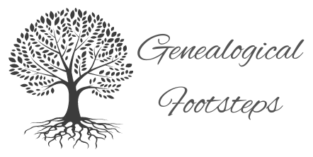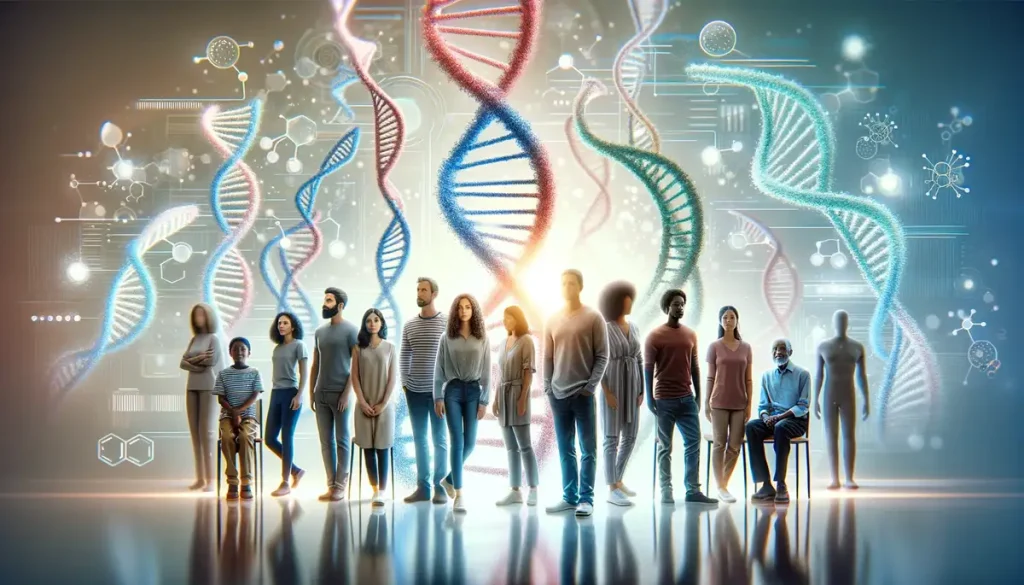Tracing one’s family history has always been a fascinating pursuit, but the advent of DNA testing has brought a new level of accuracy and certainty to the process. With the help of genetic ancestry research, individuals can gain valuable insights into their ancestral heritage and uncover lineage DNA mysteries that may have remained hidden for generations.
Through the analysis of genetic markers, DNA testing for ancestry can provide information about geographical origins, migration patterns, and interconnections between different population groups. This can help individuals build a more comprehensive picture of their family tree and discover new branches and connections they may not have known existed.
Key Takeaways:
- Genetic ancestry research is a powerful tool for unravelling lineage DNA mysteries in family trees.
- DNA testing for ancestry can provide insights into geographical origins, migration patterns, and interconnections between different population groups.
Exploring Ancestral Lineage: The Power of DNA Genealogy Investigation
Ancestral lineage exploration is an exciting journey of discovery, and DNA genealogy investigation is a powerful tool that can make it possible. DNA testing for ancestry can help individuals trace their genetic roots and uncover family history mysteries that traditional genealogy research may struggle to solve.
By analysing an individual’s DNA, DNA genealogy investigation can provide valuable insights into their geographical origins and connections to different population groups. DNA testing can reveal information about one’s ethnicity and can even identify long-lost relatives or solve cases of unknown parentage.
With the advent of new scientific technologies, DNA genealogy investigation has become increasingly accurate and accessible. There are several types of DNA tests available, including autosomal DNA testing, mitochondrial DNA testing and Y-chromosome DNA testing. Each test can provide unique information about an individual’s ancestry and family history.
To begin a DNA genealogy investigation, individuals must first obtain a DNA sample. This can be done through a simple cheek swab or saliva sample. The DNA sample is then analysed in a laboratory to extract genetic information, which is compared to reference databases of known populations to identify genetic markers associated with ancestral heritage.
While DNA genealogy investigation can be a powerful tool in uncovering family history mysteries, it is important to note that it is not a complete solution. DNA testing for ancestry has its limitations, and results should be interpreted with caution. Genetic markers can be influenced by a variety of factors, including genetic mutations, and results can be affected by the availability of reference databases.
Scientific Breakthroughs: Uncovering Lineage Secrets Through DNA Testing
Genetic ancestry research has undergone a revolutionary transformation in recent years with the aid of scientific breakthroughs in DNA testing. DNA testing for ancestry has become a powerful tool for unravelling lineage mysteries and tracing genetic roots.
The process of genetic roots unravelling through DNA testing for ancestry begins with obtaining a DNA sample. This can be done through a saliva or cheek swab, which is then analysed in a laboratory. Different types of DNA tests are available, with the most common being autosomal DNA testing. This type of test examines all the chromosomes and provides a comprehensive view of one’s genetic ancestry.
Another type of DNA testing for ancestry is mitochondrial DNA (mtDNA) testing, which examines the matrilineal line. This type of testing is useful for tracing distant maternal ancestry, as mtDNA is passed down exclusively from mothers to their offspring.
Y-chromosome DNA (Y-DNA) testing is a third type of DNA testing for ancestry that examines the patrilineal line. This type of testing is useful for tracing paternal ancestry, as the Y chromosome is passed down exclusively from fathers to their male offspring.
DNA testing for ancestry has become a valuable tool for understanding the geographic origins, migration patterns, and interconnections between different populations. Genetic markers are used to trace one’s ancestral heritage through the analysis of DNA mutations. These markers, or DNA sequences, act like signposts that guide geneticists in their quest to unravel lineage mysteries.
Despite the scientific advancements in DNA testing for ancestry, there are limitations to its accuracy and interpretation. One of the biggest challenges is the limited availability of reference databases, which means that some ethnic groups may be underrepresented in the results. Additionally, genetic mutations can complicate the analysis of DNA markers, leading to false positives or negatives in ancestral lineage exploration.
Despite these limitations, DNA testing for ancestry remains a powerful tool for genetic ancestry research. It has provided individuals with a better understanding of their ancestral heritage and has helped to uncover hidden family connections. With continued advancements in the field, DNA testing for ancestry is poised to become an even more valuable tool for unravelling lineage mysteries and understanding our shared human history.

Understanding the Family Tree Puzzle: Solving Lineage DNA Mysteries
The complexities of the family tree puzzle can be daunting for anyone attempting to explore their family history. Traditional genealogy research can often come up short when trying to solve family history mysteries or uncover lost relatives. However, DNA testing has revolutionised the field of genetic ancestry research, providing valuable insights into ancestral lineage exploration.
Exploring family tree mysteries has become more accessible and fruitful with the help of DNA analysis. Genetic testing can provide valuable information about hidden family connections and help solve lineage DNA mysteries.
For instance, a DNA test can confirm or refute the biological relationship between two individuals who are suspected of being related. Furthermore, DNA matching can help individuals discover previously unknown relatives and gain insight into their ancestral history.
Genetic Markers – A Crucial Factor In Solving Lineage DNA Mysteries
Genetic markers play a crucial role in DNA ancestry testing. Generally, genetic markers are segments of DNA that vary among individuals and can be analysed to reveal genetic information. In lineage DNA testing, genetic markers help in assessing ancestral heritage and identifying family relationships.
By analysing specific genetic markers, ancestral migrations and geographical origins can be determined. Genetic markers can also provide clues to relationships between different population groups and reveal patterns of migration and intermarriage.
Exploring family tree mysteries through DNA testing can help individuals gain a greater understanding of their ancestral heritage and how they are connected to their familial roots.
Reconstructing the Past: The Role of Lineage DNA in Ancestral Heritage Discovery
Lineage DNA testing has opened up a whole new world of possibilities for those seeking to uncover their ancestral heritage. Through the study of genetic markers, scientists can trace the movements of our ancestors across the globe, revealing hidden connections and shedding light on the mysteries of our family history.
By analysing our DNA, lineage testing can provide clues about our geographical origins and the migrations of our ancestors. This information can help individuals connect with their ancestral heritage and gain a deeper understanding of their place in the world.
One of the key benefits of DNA testing for ancestry is the ability to uncover lineage secrets that may have been lost over time. Genetic markers can reveal unexpected family connections, uncovering relatives that may have been lost to history. By understanding our genetic roots, we can piece together the puzzle of our family tree and gain a clearer picture of our ancestral heritage.
Lineage DNA testing can also help to bridge gaps in traditional genealogy research, which can be challenging due to incomplete records or the lack of documentation. DNA analysis provides a new avenue for exploration, allowing individuals to explore their family history in a whole new way.
Exploring Lineage DNA Testing: How It Works and What to Expect
Lineage DNA testing is a valuable tool for genetic ancestry research, providing individuals with insights into their biological roots and ancestral heritage. There are different types of DNA tests available, each with its own unique benefits and limitations. Here is a brief overview of how lineage DNA testing works and what individuals can expect from the testing process.
Types of DNA Tests
The most common types of DNA tests for ancestry are autosomal, mitochondrial, and Y-DNA testing. Autosomal DNA testing is the most comprehensive and can provide information about ancestry from both the maternal and paternal sides of the family. Mitochondrial DNA testing focuses on the maternal line and can be useful in tracing maternal ancestry back many generations. Y-DNA testing, on the other hand, focuses on the paternal line and can provide information about the male lineage.
| Type of Test | Focus | Benefits |
|---|---|---|
| Autosomal DNA testing | Maternal and paternal lines | Comprehensive ancestry information |
| Mitochondrial DNA testing | Maternal line | Traces ancestry back many generations |
| Y-DNA testing | Paternal line | Provides information about male lineage |
Testing Process
The testing process typically involves ordering a DNA test kit from a reputable genetic testing company, which will provide instructions on how to collect a DNA sample (usually through saliva or a cheek swab). Once the sample is collected, it is sent back to the company for analysis. The results of the test are usually available in a few weeks and can be accessed through an online portal or sent via mail.
Interpreting Results
The interpretation of DNA test results can be complex and may require some knowledge of genetic ancestry research. Depending on the type of test taken, results may include information about ethnicity estimates, matches with genetic relatives, and haplogroups (groups of people who share a common ancestor). Many testing companies offer tools for exploring and interpreting DNA test results, and some provide access to genetic counsellors who can help individuals make sense of their findings.

Case Studies: Real-Life Examples of Lineage DNA Mysteries Solved
Stories of individuals discovering unexpected or hidden family connections through genetic ancestry research have become increasingly common in recent years, highlighting the power of DNA genealogy investigation in solving lineage DNA mysteries.
One such case involves a woman named Mary, who had been adopted as a baby and had no knowledge of her biological family. After taking a DNA test through a popular genetic testing company, she discovered that she had a half-sister whom she had never known existed. Through further research and communication, Mary was able to connect with her biological family and learn about her ancestry.
In another instance, a man named John had always been told that his father was of Irish descent. However, after taking a DNA test, he discovered that his genetic makeup was actually more Scottish than Irish. This led him to uncover a family secret: his mother had had an affair with a Scottish man, who was in fact his biological father.
Similarly, genetic ancestry research has helped individuals identify long-lost relatives, confirm suspected relationships, and even solve criminal cases.
“DNA testing has revolutionised genealogy and made it possible for people to answer questions that they never thought they would be able to answer,” says genetic genealogist CeCe Moore.
As more people turn to genetic ancestry research to explore their family history, it is likely that many more stories of lineage DNA mysteries being solved will emerge.
Ethical Considerations in Lineage DNA Testing and Research
While genetic ancestry research and DNA testing for ancestry have provided unprecedented insight into our family history and cultural heritage, they also raise important ethical considerations.
One key ethical issue is privacy. Individuals who undergo DNA testing may unknowingly expose their genetic information to unintended parties, such as insurance companies or law enforcement agencies. As such, it is important for genetic testing companies to ensure the confidentiality and security of their customers’ data.
In addition, consent is a crucial component of ethical DNA testing and research. Individuals should be fully informed of the potential risks and benefits of genetic testing and provide explicit consent before providing a DNA sample.
Unexpected results in lineage DNA testing can also have a significant emotional impact on individuals and families. Genetic testing companies have a responsibility to provide adequate support and counselling services to help individuals navigate the complexities of ancestral heritage discovery.
Finally, it is essential to consider the potential societal implications of lineage DNA testing and research. DNA analysis has been used to investigate historical events such as slavery and colonialism, but it is important to approach such research with caution and sensitivity to ensure that it is not used to perpetuate harmful stereotypes or undermine cultural identities.
Exploring the Limitations: Understanding the Boundaries of Lineage DNA Testing
As with any scientific method, lineage DNA testing has its limitations. It is important to understand these boundaries to avoid misinterpretation of results. Genetic ancestry research is a rapidly evolving field, and our current understanding may change with new discoveries.
One major limitation is the availability of reference databases. DNA testing relies on comparing an individual’s DNA with a reference database of known genetic variations. If the reference database is limited or biased towards certain populations, it may result in inaccurate interpretations of genetic ancestry.
Another factor to consider is the influence of genetic mutations. Mutations can affect the accuracy of DNA testing, particularly in cases where a mutation has occurred in a genetic marker used for analysis. In some cases, mutations may lead to false positives, which suggest a genetic connection where none exists, or false negatives, where a true genetic connection is not detected.
Finally, it is important to acknowledge the potential for emotional distress resulting from unexpected or conflicting results. Genetic testing for ancestry can reveal unexpected family secrets or raise questions about identity, which may lead to anxiety and confusion.
Despite these limitations, genetic ancestry research offers a powerful tool for exploring family history mysteries and uncovering lineage DNA secrets. By understanding the boundaries of lineage DNA testing, individuals can make informed decisions about their testing options and interpret their results with greater accuracy.

Genetic Counselling: Navigating Lineage DNA Discoveries and Emotional Impact
While investigating ancestral lineage through DNA testing can be an exciting and enlightening process, it can also be emotionally challenging. Many individuals may experience unexpected results, such as discovering family secrets or finding out they are not biologically related to a parent or grandparent. Genetic counselling can provide much-needed support and guidance during these times of uncertainty and emotional turmoil.
Genetic counsellors are trained professionals who specialise in helping people understand the results of genetic testing and navigate the emotional and psychological impact of these findings. They can provide information and resources to help individuals and families cope with the implications of lineage DNA discoveries and make informed decisions about their healthcare and family planning.
During a genetic counselling session, the counsellor will review the individual’s medical and family history, explain the implications of the DNA test results, and help the individual understand any potential health risks that may arise from the genetic findings. They can also provide information about available support groups and resources for emotional support and further exploration of the individual’s ancestral heritage.
It’s important to note that genetic counselling is not mandatory before or after DNA testing, but it can be a valuable resource for those who feel uncertain or overwhelmed by the results of their ancestral lineage exploration. Additionally, some genetic testing companies may offer genetic counselling services as part of their testing package, but it’s essential to research the company’s policies and qualifications before selecting a service.
Future Directions: Advancements in Lineage DNA Research and Beyond
The field of genetic ancestry research is rapidly evolving, and new advancements in DNA testing technology are constantly emerging. Whole-genome sequencing is one such development that holds great promise for the future of lineage DNA research. With this technology, it will be possible to analyse an individual’s entire genome, providing a more comprehensive understanding of their genetic makeup and ancestral heritage. This could lead to more accurate and detailed ancestral lineage exploration, as well as the identification of genetic markers associated with specific diseases.
In addition to advancements in lineage DNA research, DNA testing is also playing an increasingly important role in the field of personalised medicine. By analysing an individual’s DNA, doctors can gain insights into their risk for certain diseases and develop personalised treatment plans tailored to their genetic makeup. As genetic testing becomes more widespread, it has the potential to transform the way we approach healthcare.
Lineage DNA Mysteries – Conclusion
In conclusion, decoding lineage DNA mysteries is crucial in uncovering our familial roots and understanding our personal and collective history. Ancestral lineage exploration has been revolutionised by scientific breakthroughs in genetic ancestry research, particularly DNA testing for ancestry.
DNA genealogy investigation has played a significant role in helping individuals trace their genetic roots and solve family history mysteries. By analysing genetic markers, DNA testing can provide valuable insights into geographical origins, migrations, and interconnections between different population groups.
While lineage DNA testing has its limitations, advancements in the field, such as whole-genome sequencing, may enhance our understanding of ancestral heritage exploration and have potential implications beyond genealogy, such as personalised medicine.
It is important to address the ethical considerations surrounding lineage DNA testing and research, particularly issues of privacy and consent. Additionally, genetic counseling can provide guidance and support to individuals and families in navigating the emotional impact of unexpected results and the complexities of ancestral heritage discovery.

My name is Anthony, the founder of Genealogical Footsteps. I have over 20 years of dedicated experience in family history and genealogy (although I am not a professional genealogist). I hold BA in history, and am considering further education (despite my age). My journey in genealogy has led me to remarkable discoveries and projects, particularly where my Cypriot genealogy is concerned. I am passionate about uncovering the stories behind names and have helped friends and family connect with their heritage, including those with Cypriot, Celtic, and Viking ancestry. Click here to read more about me.



